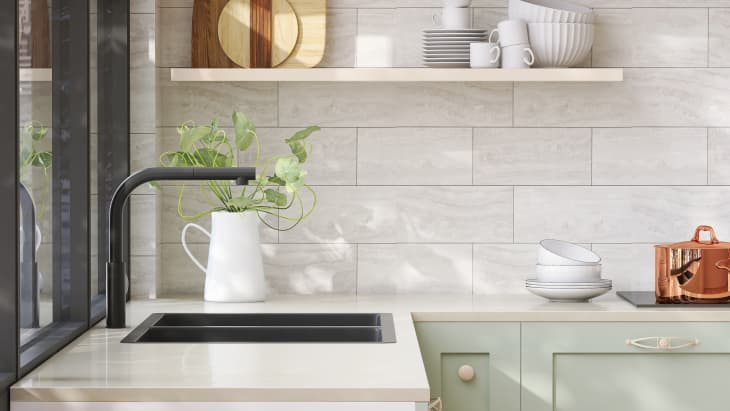I Tried 3 DIY Countertop Cleaners — And One of Them Was the Clear Winner

I’ve always wanted to be a person who uses homemade cleaners because it’s the frugal, eco-responsible thing to do. The problem is, am I really going to take the time to mix something that isn’t a mocktail? (Historically, signs point to no.) And there are so many recipes — just deciding what to put in the spray bottle feels exhausting. Plus, what if it doesn’t work? You see how I failed to get started for so long.
3 DIY Countertop Cleaners to Try
- Dish soap and water: Mix two cups of water and a tablespoon of dish soap and pour into a spray bottle.
- Citrus vinegar, Castile soap, and water: Make citrus vinegar and combine 1/2 cup of it sans peels with a cup of water and a teaspoon of Castile soap into a spray bottle. Shake before use.
- Vinegar and water: Combine a 1:1 ratio of white vinegar and water in a spray bottle.
But my days of eco-envy are over, and this week I mixed not one, but three different solutions to clean the laminate countertops in my teardrop camper. Below I detail the recipes and how each one performed (spoiler alert: There’s a clear winner, but I loved the runner-up).
How I Set Up the Test
My camper is only a few months old and stain-free so far, so I taped off three test areas and spattered them with difficult-to-clean spills: honey, caramel, and ketchup. For each cleaning attempt, I used three sprays of solution.
Method 1: Dish Soap and Water
I had the highest hopes for the dish soap and water combo because dish soap is my go-to stain remover for clothing. I don’t love the smell of vinegar, so I was also eager for this vinegar-free solution to be the best for sensory reasons. I used two cups of water mixed with a tablespoon of dish soap.
Final grade: 7/10 — The mess I created was a doozy, and it took four attempts for the dish soap and water combination to remove all the stickiness. It did successfully clean the counters, but I docked three points for relative inefficiency.
Method 2: Citrus Vinegar, Castile Soap, and Water
I wanted the citrus vinegar, castile soap, and water method to fail because it was the most labor-intensive and expensive to make, but — of course — it was the best of them all. To make this homemade cleaning spray, pack a quart-sized Mason jar with citrus peel, cover it with vinegar, and let it sit for two weeks in a sunny window. (Alternatively, you can microwave the mixture if you’re in a hurry.) Combine 1/2 cup of citrus-infused vinegar — sans peels — with 1 cup water and a teaspoon of castile soap. Shake the mixture before use.
Final grade: 9/10 — Even with the hassle of the elaborate preparation, I have to admit the citrus made the vinegar smell go away, and the spray was effective and pleasant to use. This solution cleared the mess in only three attempts and smelled great doing it. I docked one point for the high-maintenance recipe.
Method 3: Vinegar and Water
For the vinegar and water solution, I used a 1:1 ratio. As expected, the mixture smelled like vinegar. Also expected, I hated it. It was easy to mix and use, however, and affordable, too.
Final grade: 6/10 — As with the dish soap and water combo, the vinegar and water solution took four attempts to clean the counter. I docked an extra point for the unpleasant smell.
DIY Counter Spray Results
Here’s the good news: All three versions worked. While the citrus vinegar and castile soap combination got the highest rating, I’ll probably stick with the dish soap and water method, because it is much less labor-intensive to mix, smells pleasant, and works. If you have the time and inclination, however, sun those citrus peels to your heart’s content.
If you can tolerate the smell, the vinegar-to-water ratio is easy to remember (1:1) and it is just as effective as the soap and water combination. If you have stone countertops, however, you shouldn’t use vinegar-based cleaners because they may damage the stone. Stick to the soap and water method.
I’m delighted to have these cleaning sprays in my repertoire and skip the commercial versions. The process was straightforward and uncomplicated. The only hard part was finally deciding to give it a try.